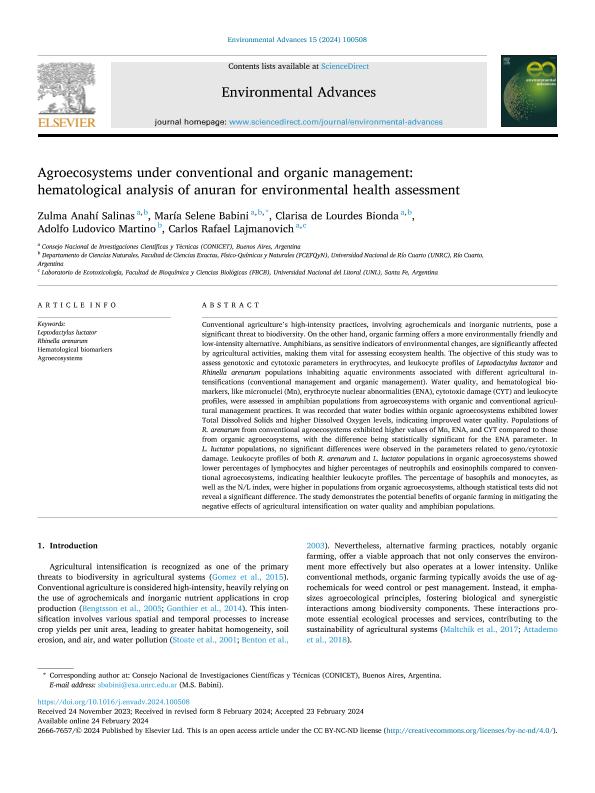Artículo
Agroecosystems under conventional and organic management: hematological analysis of anuran for environmental health assessment
Salinas, Zulma Anahí ; Babini, María Selene
; Babini, María Selene ; Bionda, Clarisa de Lourdes
; Bionda, Clarisa de Lourdes ; Martino, Adolfo Ludovico; Lajmanovich, Rafael Carlos
; Martino, Adolfo Ludovico; Lajmanovich, Rafael Carlos
 ; Babini, María Selene
; Babini, María Selene ; Bionda, Clarisa de Lourdes
; Bionda, Clarisa de Lourdes ; Martino, Adolfo Ludovico; Lajmanovich, Rafael Carlos
; Martino, Adolfo Ludovico; Lajmanovich, Rafael Carlos
Fecha de publicación:
04/2024
Editorial:
Elsevier
Revista:
Environmental Advances
ISSN:
2666-7657
Idioma:
Inglés
Tipo de recurso:
Artículo publicado
Clasificación temática:
Resumen
Conventional agriculture´s high-intensity practices, involving agrochemicals and inorganic nutrients, pose a significant threat to biodiversity. On the other hand, organic farming offers a more environmentally friendly and low-intensity alternative. Amphibians, as sensitive indicators of environmental changes, are significantly affected by agricultural activities, making them vital for assessing ecosystem health. The objective of this study was to assess genotoxic and cytotoxic parameters in erythrocytes, and leukocyte profiles of Leptodactylus luctator and Rhinella arenarum populations inhabiting aquatic environments associated with different agricultural intensifications (conventional management and organic management). Water quality, and hematological biomarkers, like micronuclei (Mn), erythrocyte nuclear abnormalities (ENA), cytotoxic damage (CYT) and leukocyte profiles, were assessed in amphibian populations from agroecosystems with organic and conventional agricultural management practices. It was recorded that water bodies within organic agroecosystems exhibited lower Total Dissolved Solids and higher Dissolved Oxygen levels, indicating improved water quality. Populations of R. arenarum from conventional agroecosystems exhibited higher values of Mn, ENA, and CYT compared to those from organic agroecosystems, with the difference being statistically significant for the ENA parameter. In L. luctator populations, no significant differences were observed in the parameters related to geno/cytotoxic damage. Leukocyte profiles of both R. arenarum and L. luctator populations in organic agroecosystems showed lower percentages of lymphocytes and higher percentages of neutrophils and eosinophils compared to conventional agroecosystems, indicating healthier leukocyte profiles. The percentage of basophils and monocytes, as well as the N/L index, were higher in populations from organic agroecosystems, although statistical tests did not reveal a significant difference. The study demonstrates the potential benefits of organic farming in mitigating the negative effects of agricultural intensification on water quality and amphibian populations.
Archivos asociados
Licencia
Identificadores
Colecciones
Articulos (ICBIA)
Articulos de INSTITUTO DE CIENCIAS DE LA TIERRA, BIODIVERSIDAD Y AMBIENTE
Articulos de INSTITUTO DE CIENCIAS DE LA TIERRA, BIODIVERSIDAD Y AMBIENTE
Articulos(CCT - SANTA FE)
Articulos de CTRO.CIENTIFICO TECNOL.CONICET - SANTA FE
Articulos de CTRO.CIENTIFICO TECNOL.CONICET - SANTA FE
Citación
Salinas, Zulma Anahí; Babini, María Selene; Bionda, Clarisa de Lourdes; Martino, Adolfo Ludovico; Lajmanovich, Rafael Carlos; Agroecosystems under conventional and organic management: hematological analysis of anuran for environmental health assessment; Elsevier; Environmental Advances; 15; 100508; 4-2024; 1-9
Compartir
Altmétricas



